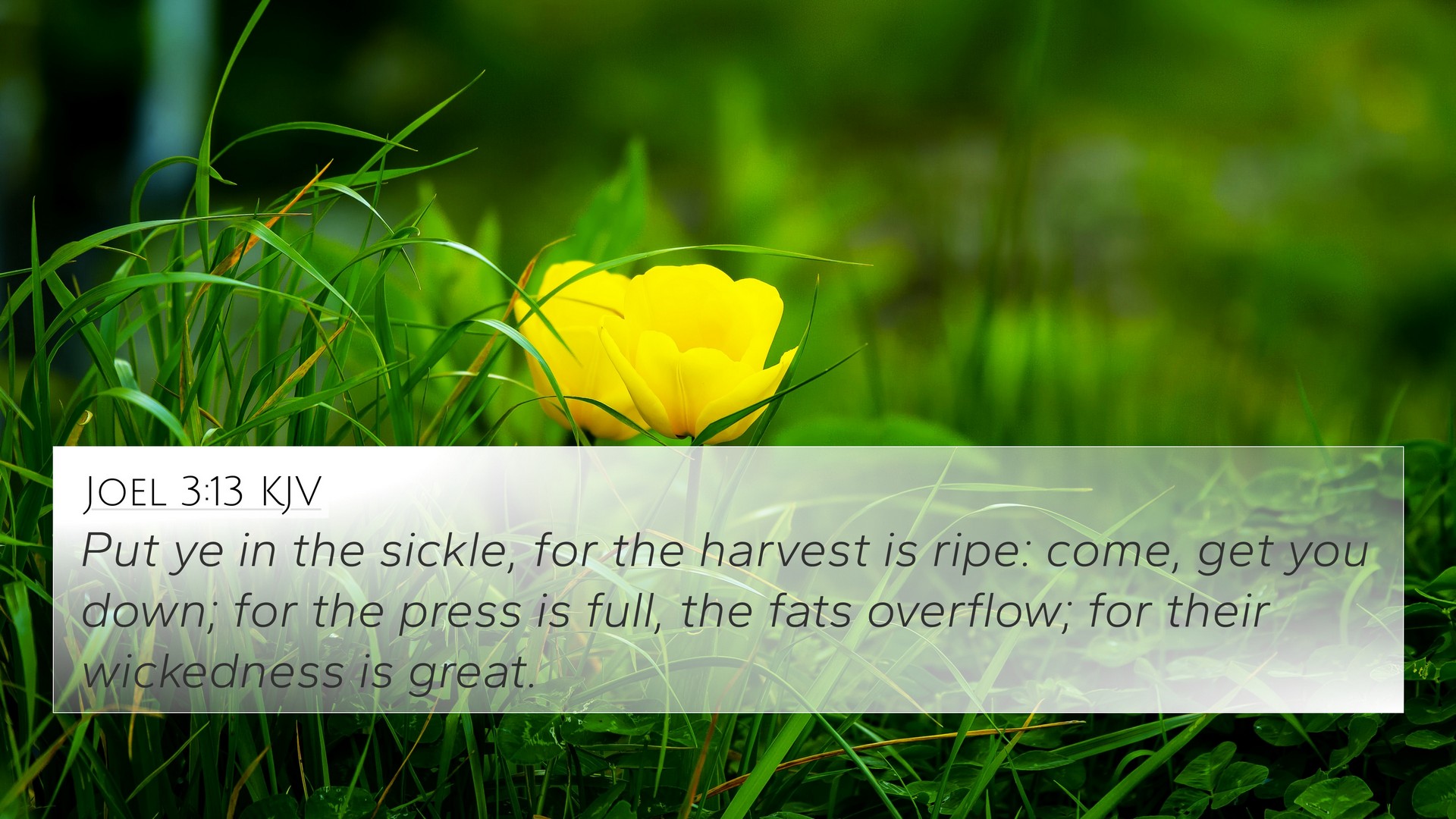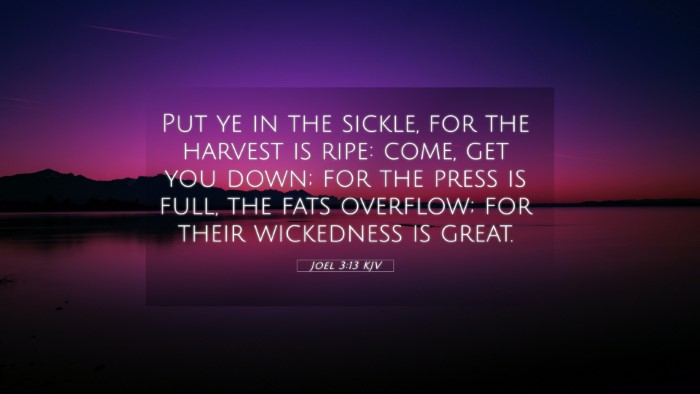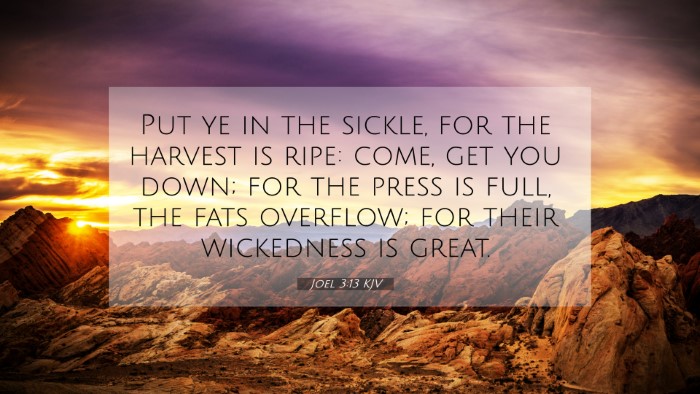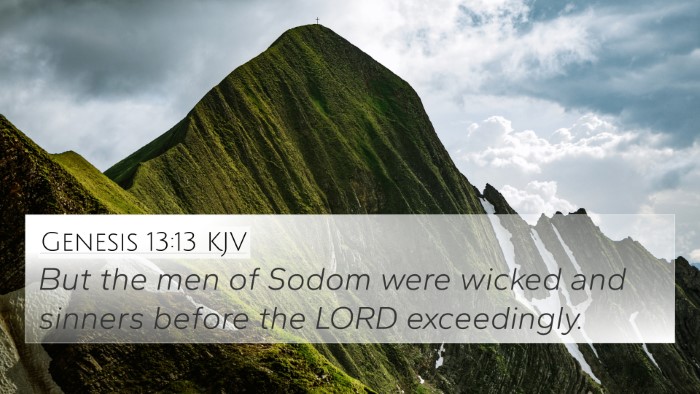Old Testament
Genesis Exodus Leviticus Numbers Deuteronomy Joshua Judges Ruth 1 Samuel 2 Samuel 1 Kings 2 Kings 1 Chronicles 2 Chronicles Ezra Nehemiah Esther Job Psalms Proverbs Ecclesiastes Song of Solomon Isaiah Jeremiah Lamentations Ezekiel Daniel Hosea Joel Amos Obadiah Jonah Micah Nahum Habakkuk Zephaniah Haggai Zechariah MalachiJoel 3:13 Similar Verses
Joel 3:13 Cross References
Put ye in the sickle, for the harvest is ripe: come, get you down; for the press is full, the fats overflow; for their wickedness is great.
Uncover the Rich Themes and Topics of This Bible Verse
Listed below are the Bible themes associated with Joel 3:13. We invite you to explore each theme to gain deeper insights into the Scriptures.
Joel 3:13 Cross Reference Verses
This section features a detailed cross-reference designed to enrich your understanding of the Scriptures. Below, you will find carefully selected verses that echo the themes and teachings related to Joel 3:13 KJV. Click on any image to explore detailed analyses of related Bible verses and uncover deeper theological insights.
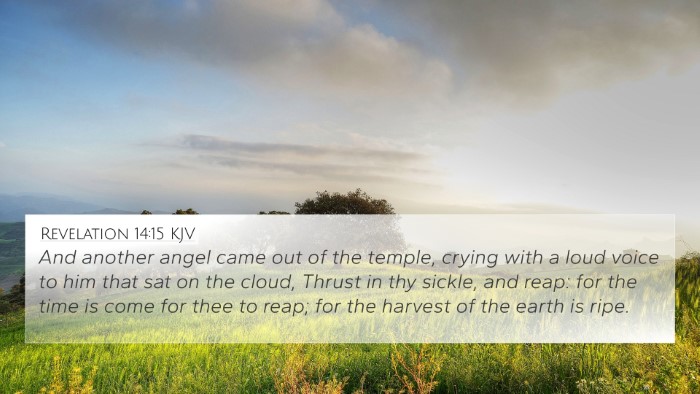
Revelation 14:15 (KJV) »
And another angel came out of the temple, crying with a loud voice to him that sat on the cloud, Thrust in thy sickle, and reap: for the time is come for thee to reap; for the harvest of the earth is ripe.
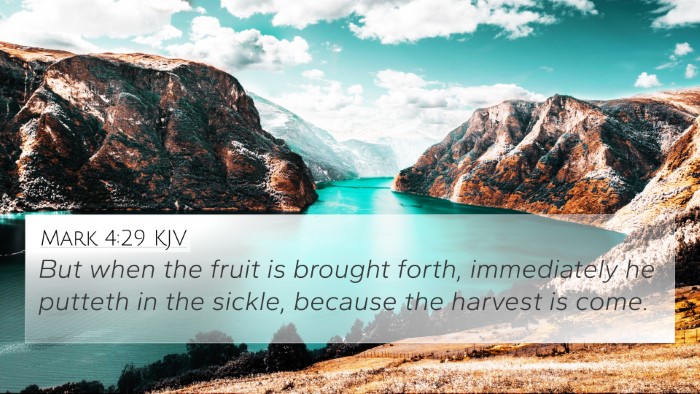
Mark 4:29 (KJV) »
But when the fruit is brought forth, immediately he putteth in the sickle, because the harvest is come.
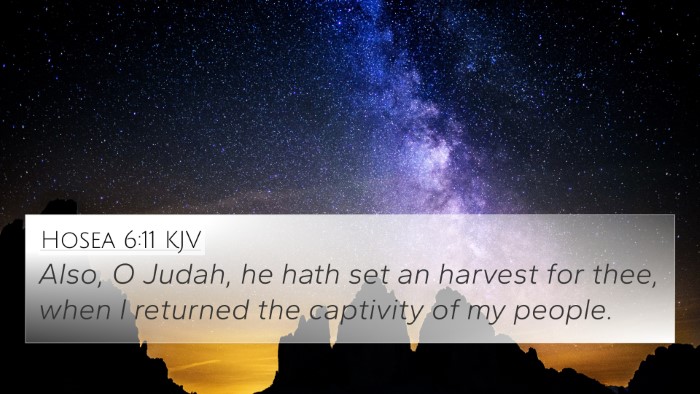
Hosea 6:11 (KJV) »
Also, O Judah, he hath set an harvest for thee, when I returned the captivity of my people.
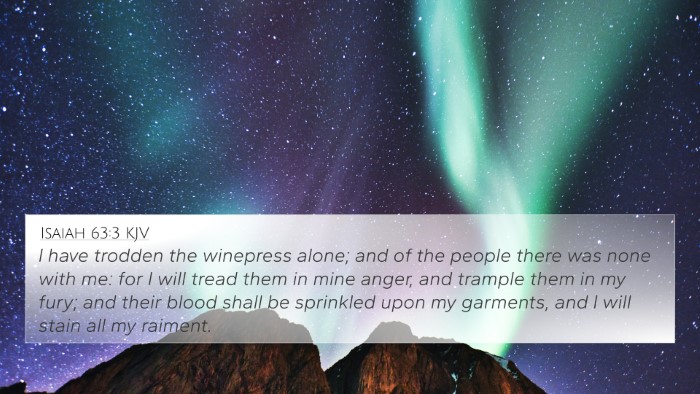
Isaiah 63:3 (KJV) »
I have trodden the winepress alone; and of the people there was none with me: for I will tread them in mine anger, and trample them in my fury; and their blood shall be sprinkled upon my garments, and I will stain all my raiment.
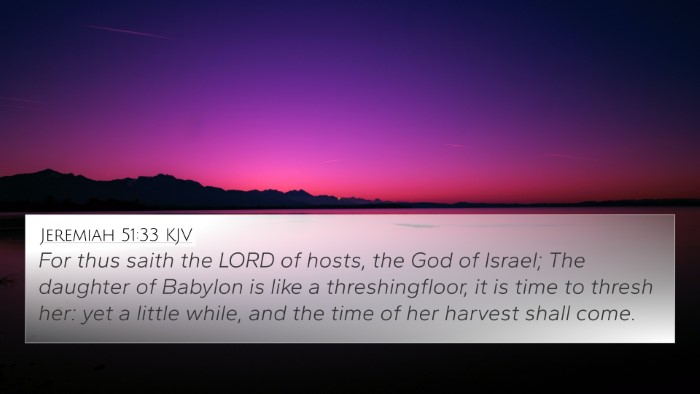
Jeremiah 51:33 (KJV) »
For thus saith the LORD of hosts, the God of Israel; The daughter of Babylon is like a threshingfloor, it is time to thresh her: yet a little while, and the time of her harvest shall come.
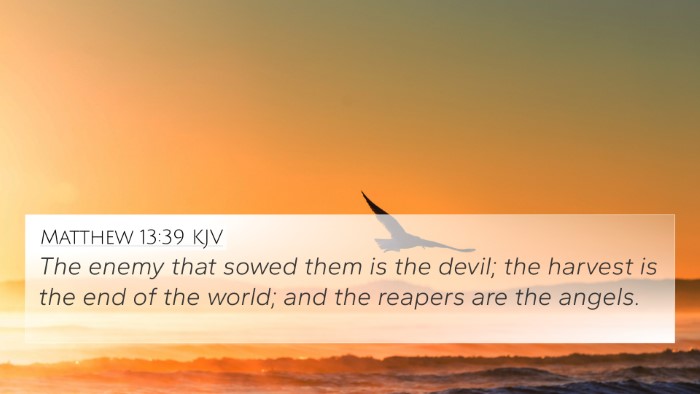
Matthew 13:39 (KJV) »
The enemy that sowed them is the devil; the harvest is the end of the world; and the reapers are the angels.
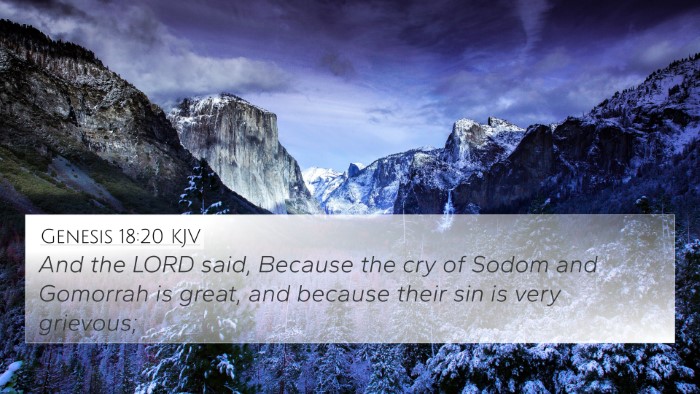
Genesis 18:20 (KJV) »
And the LORD said, Because the cry of Sodom and Gomorrah is great, and because their sin is very grievous;
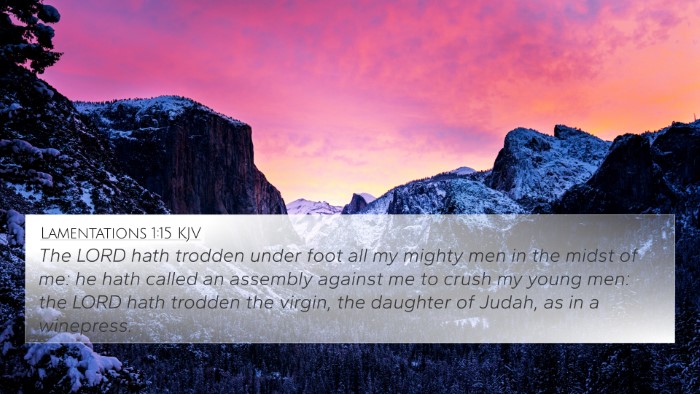
Lamentations 1:15 (KJV) »
The LORD hath trodden under foot all my mighty men in the midst of me: he hath called an assembly against me to crush my young men: the LORD hath trodden the virgin, the daughter of Judah, as in a winepress.
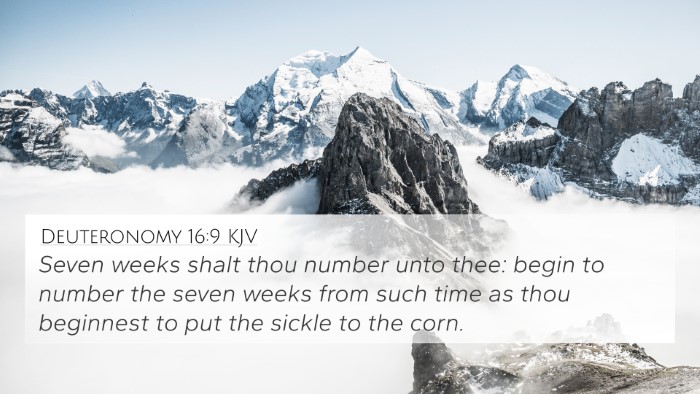
Deuteronomy 16:9 (KJV) »
Seven weeks shalt thou number unto thee: begin to number the seven weeks from such time as thou beginnest to put the sickle to the corn.
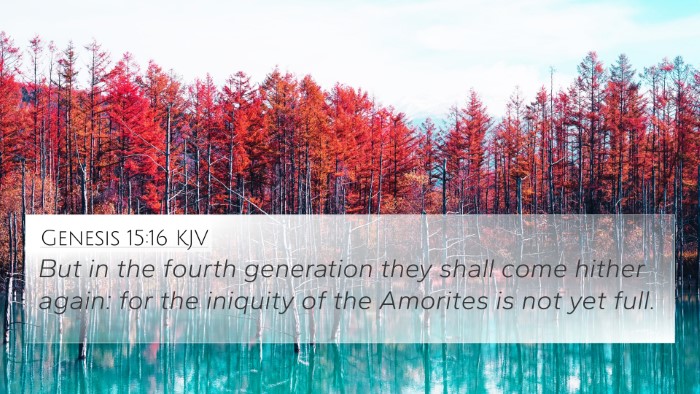
Genesis 15:16 (KJV) »
But in the fourth generation they shall come hither again: for the iniquity of the Amorites is not yet full.
Joel 3:13 Verse Analysis and Similar Verses
Understanding Joel 3:13
Scripture: Joel 3:13 - "Put in the sickle, for the harvest is ripe; come, go down; for the press is full, the vats overflow; for their wickedness is great."
Summary of Meaning
This verse speaks of a time of divine judgment where the harvest metaphorically represents the gathering of nations for God's reckoning. The sickle, an agricultural tool, signifies the execution of judgment, illustrating that the time has come for the righteous to reap while the wicked face consequences for their actions. The imagery of a full press and overflowing vats signifies abundance but also judgment, as the excess reflects the overflowing iniquity of the people.
Insights from Various Commentaries
Matthew Henry's Commentary
Matthew Henry emphasizes the urgency of the harvest, indicating that the gathering of the wicked for judgment is imminent. The "sickle" symbolizes the divine call to action, where God's patience has reached its limit, and the time for judgment has finally come. The overflowing press illustrates the intensity of the judgment about to be executed on those who have engaged in wickedness, showing no area left untouched by God's righteous wrath.
Albert Barnes' Notes
Albert Barnes interprets the harvest metaphorically, indicating that the wickedness of the nations has become so great that it is time to reap what has been sown. He draws connections to other scriptures indicating God's judgment is decisive and unavoidable. The “vats overflowing” serves as a warning of the consequences of sinful actions. Barnes points out that this verse serves as both a literal and figurative call to accountability for the nations.
Adam Clarke's Commentary
Adam Clarke focuses on the agricultural symbolism within the text. He elaborates that this verse indicates a judgment not just on individuals but on whole nations, signifying the collective responsibility for sin. Clarke notes that God's justice sees beyond measure; thus, the imagery of the overflowing vats captures the gravity of the situation. The statement highlights both the certainty and the severity of divine judgment and the reaping of what has been sown over time.
Related Bible Cross-References
- Matthew 13:39-40 - Each harvest time, the angels gather the wicked for judgment.
- Revelation 14:15 - A call to reap the harvest of the earth, representing a final judgment.
- Galatians 6:7 - "For whatever one sows, that will he also reap," relating to the idea of a harvest based on deeds.
- Proverbs 1:31 - "Therefore they shall eat the fruit of their way," echoing the themes of reaping what one sows.
- Isaiah 17:11 - The image of reaping when seeds have not matured signifies impending judgment due to wickedness.
- Jeremiah 51:33 - "The daughter of Babylon is like a threshing floor at the time when it is trodden," signaling impending punishment.
- Hosea 10:12 - "Sow for yourselves righteousness; reap steadfast love," demonstrating the duality of sowing and reaping.
- 1 Corinthians 3:13 - "Each one's work will become manifest, for the Day will disclose it," correlating to God’s judgment of deeds.
- Malachi 4:1 - The coming day will burn like an oven, indicating judgment for the wicked.
- Luke 10:2 - "The harvest is plentiful, but the laborers are few," associating the harvest metaphor with urgent divine action.
Thematic Connections
Joel 3:13 serves as an excellent example of how to engage in Bible verse cross-references. By analyzing this verse alongside the related scriptures, we uncover rich insights into God's justice and the urgency of accountability in both the Old and New Testaments. This comparative Bible verse analysis reveals a profound interconnectedness within the Biblical narrative, illustrating God's unwavering call for righteousness and His ultimate judgment over the earth.
Tools and Techniques for Bible Cross-Referencing
Utilizing tools such as a Bible concordance or Bible cross-reference guide can enhance your understanding of how scriptures interrelate. By recognizing the thematic Bible verse connections, one can cultivate a more profound comprehension of Biblical teachings. Here are a few methods to effectively study Biblical connections:
- Identify Themes: Pinpoint core themes such as judgment, righteousness, and divine justice found in Joel 3:13.
- Question Connections: Ask questions like, "How does this verse relate to others that discuss judgment?" to deepen your exploration.
- Document Findings: Keep a journal or digital record of insights and verses that connect to enhance your personal study.
- Group Studies: Engage in group Bible studies where members can share insights and uncover connections.
- Use Study Resources: Lean on comprehensive cross-reference materials to enrich your understanding of connections.
Conclusion
Joel 3:13 intricately weaves themes of divine judgment and accountability, illustrated through agricultural imagery. By leveraging cross-referencing Biblical texts, readers can grasp deeper meanings and establish significant parallels throughout scripture. This verse not only serves as a stark reminder of the consequences of sin but also encourages believers to sow righteousness and seek God’s mercy. By exploring the inter-Biblical dialogue created by connecting themes across the scriptures, we can enhance our spiritual journey and understanding of God's overarching narrative.
